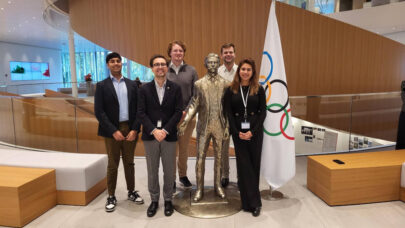Balancing ‘leadership polarities’ is key to navigating an increasingly uncertain world
The effects of soaring inflation, financial market turmoil and the war in Ukraine have thrust the world into an era of fresh turmoil. To overcome these mounting challenges, it’s clear that strong leadership is going to be critical in increasingly turbulent times.
In his keynote OWP session, Michael Watkins, Professor of Leadership and Organizational Change at IMD said: “If we’re going to avoid a future of famine, fragmentation and futility, the best hope we have is to develop the right kinds of leaders – and lots of them.”
Referencing climate change, he added: “We must undertake this work for not just the survival of our societies but perhaps in the longer run – our species.”
In navigating this volatile environment, he said that leaders needed to challenge complacency: “There is a view that history cycles through good and bad times, through golden ages and dark ages, and an associated belief that this too shall pass,” Watkins said.
“This is a dangerous belief today because we may be facing a coming of the worst of times – not a smooth slide but a catastrophic rupture that really changes everything,” he added. “We need to prepare ourselves and confront that reality.”
A popular school of thought is that hard times create strong leaders — think of Ukraine’s president Volodymyr Zelenskyy, who has been hailed as a powerful leader and communicator. “Without Russia’s invasion of Ukraine, his leadership would have been a footnote in history,” said Watkins. “ Instead, his example of great leadership will ring down the ages.”
But there’s also no guarantee that the present era of upheaval will generate the strong leaders that business and society so desperately need. “We cannot wait for that to happen. We need to mobilize, to rapidly develop a ready reserve of leaders who are prepared to deal with the crises to come,” said Watkins.
He therefore issued a “call to arms” to focus on developing young leaders with certain inherent qualities, shaped by experience, that will get their organizations through the hard times ahead.
Watkins said these qualities have consistently shown up in successful but sometimes controversial war-time leaders throughout history — not just Zelenskyy but Napoleon, Nelson, Winston Churchill and Charles de Gaulle.
Balancing ‘leadership polarities’
But these qualities won’t be found in “laundry lists” of leadership traits, he added. What matters far more than courage, integrity, inspiration and vision is the ability to manage “leadership polarities”. These are competing tensions that are unresolvable and must be balanced.
The first of six essential polarities is the tension between self-confidence and humility. “When I work with leaders taking on new roles, they often have quite incomplete knowledge and need to get up a learning curve,” said Watkins. “It’s quite dangerous to behave as if they have the answers, as they don’t, but at the same time they need to project a confident curiosity.”
More than this, they need to know when (and how) to switch between these two modes of leadership.
The second polarity is singular focus versus multi-tasking. “Every senior executive I work with is busy, and strong leaders must be able to multitask,” Watkins said. “But at the same time, the ability to get into a ‘flow state’, reduce distractions and come up with the right approaches is just so absolutely critical.”
‘Mobilize the fire within’
The third polarity is emotional regulation – the ability to generate excitement and show constraint simultaneously. “The most successful leaders tame their natural inclinations to get triggered by things, but at the same time they can mobilize the fire within to help motivate and inspire their people,” he said.
The tension between ruthlessness and compassion is the fourth polarity. For example, leaders executing a turnaround strategy may need to make tough decisions like making layoffs to save the wider organization. “The sad reality is sometimes there are these challenging choices to make, and leaders who hesitate will fail in the end,” Watkins explained.
Fifth is the tension between seizing the initiative and reacting rapidly. “Leaders know when to seize the initiative, when to be the first mover and change the game, but also when to wait for situations to mature. When things ripen they react decisively,” he said.
Innovation versus imitation is the sixth leadership polarity. Watkins said: “The leaders I work with — almost all are innovative people, they’re generating new ideas, but they are also anchored in the knowledge that you don’t need to reinvent the wheel all the time; imitation can be the way to generate a strategic advantage.”
He added that, while organizations should be bracing for further turbulence ahead, by developing “energetic leadership” they will be much better prepared to weather the storm. This is the ability of a leader to mobilize and focus the energy of individuals, teams and organizations – in order to achieve goals on a sustainable basis.
“We are heading into challenging times,” said Watkins, “and we can’t be in a state of denial about that reality. Technology may yet help us with the climate issues. Good public policy is important, too. But, in the end, it’s leadership that is going to make the difference.”



